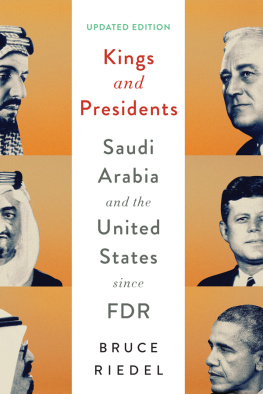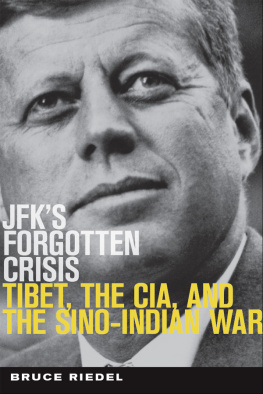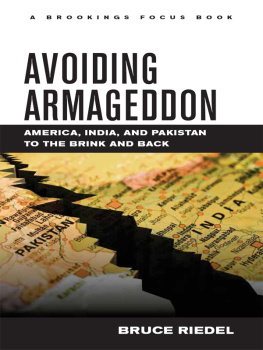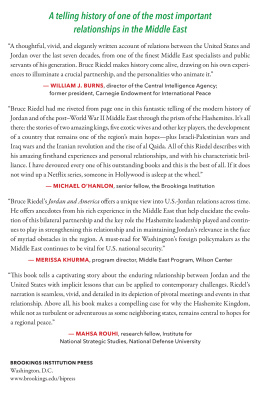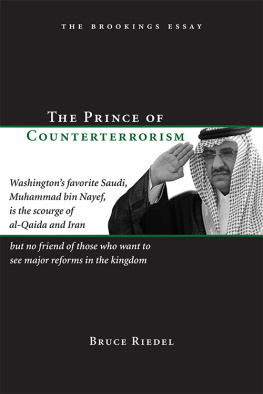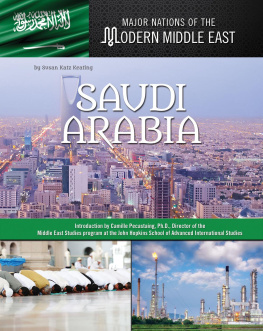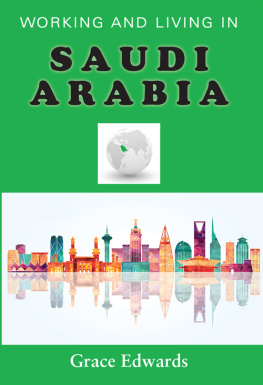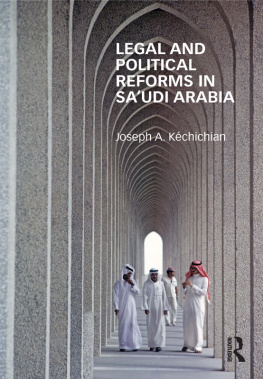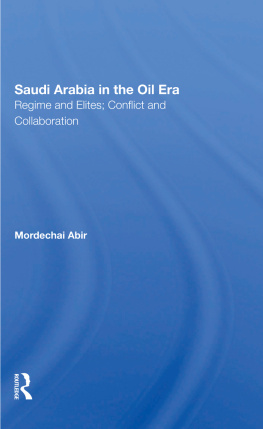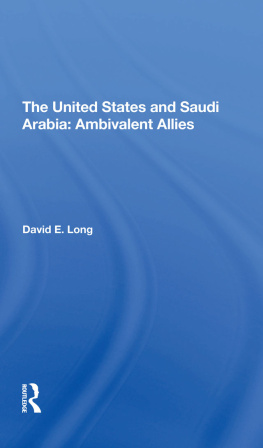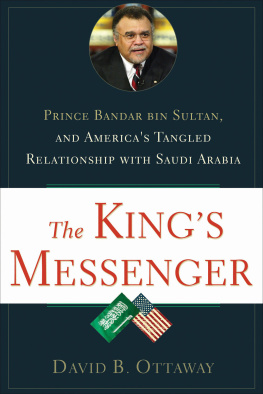Copyright 2018
THE BROOKINGS INSTITUTION
1775 Massachusetts Avenue, N.W., Washington, D.C. 20036
www.brookings.edu
All rights reserved. No part of this publication may be reproduced or transmitted in any form or by any means without permission in writing from the Brookings Institution Press.
The Brookings Institution is a private nonprofit organization devoted to research, education, and publication on important issues of domestic and foreign policy. Its principal purpose is to bring the highest quality independent research and analysis to bear on current and emerging policy problems. Interpretations or conclusions in Brookings publications should be understood to be solely those of the authors.
Library of Congress Cataloging-in-Publication data are available.
ISBN 978-0-8157-3137-5 (cloth : alk. paper)
ISBN 978-0-8157-3138-2 (ebook)
9 8 7 6 5 4 3 2 1
Typeset in Fournier MT
Composition by Westchester Publishing Services
Preface to the Paperback Edition
Jamal Khashoggi sat in the front row of the Brookings Institutions Falk Auditorium in the fall of 2017 when Brookings first launched this book. He had become a fixture at Brookings events on Saudi Arabia and the Middle East. Born in Medina, Khashoggi had made his name as a journalist covering the mujahedin in Afghanistan in the 1980s, during the war in which America and Saudi Arabia had secretly conspired to destroy the Soviet Union. He interviewed the most famous Saudi volunteer in the war, Osama bin Laden. Later he became an adviser to Prince Turki bin Faisal, the head of Saudi intelligence during the war and subsequently Saudi ambassador to first the United Kingdom and then the United States. Khashoggi became disillusioned when Muhammad bin Salman began accumulating power in 2016, disturbed by the princes reckless decision making in Yemen and elsewhere and his brutal repression of any criticism at home. Khashoggi began writing opinion pieces for the Washington Post , always affirming his loyalty to the monarchy and his country but despairing of the young princes dangerous policies. His last essay was a damning indictment of the crown princes signature policy initiative, the war in Yemen, which had become a quagmire.
On October 2, 2018, Khashoggi was murdered in the Saudi consulate in Istanbul, Turkey. He had gone there to acquire documents for his upcoming wedding. The Saudi ambassador to the United States, Prince Kamal bin Salman, had apparently sent Khashoggi to Istanbul for the documents. Inside the consulate a team of more than a dozen assassins was waiting. Jamal was tortured, murdered, and then dismembered. The assassins included members of the Royal Guard Regiment, the intelligence service, and the crown princes office. They almost certainly were there on the orders of Crown Prince Muhammad bin Salman, who wanted his most visible critic permanently silenced.
At first the Saudis denied that Khashoggi was dead, claiming he had left the consulate alive. An inchoate cover-up story was put out piecemeal that the murder had been a rogue operation carried out on the orders of the deputy chief of Saudi intelligence. The Central Intelligence Agency concluded instead that the crown prince had ordered the premeditated murder and had monitored the operation while it was under way, according to senators briefed by the CIA director on the issue. Jamals body has yet to be recovered. The Turkish defense minister Hulusi Akar has said publicly that parts of the body were probably conveyed to the Kingdom by the assassins using diplomatic immunity.
Since ascending to the number two position in the Kingdom, Muhammad bin Salman has undertaken the most repressive purge in the countrys modern history. Saudi Arabia has never had a good human rights record, but the level of repression has increased noticeably since Muhammad bin Salman became crown prince. On November 4, 2017, almost four hundred prominent Saudis were detained without charge at the Ritz Carlton Hotel in Riyadh, held incommunicado, and forced to hand over substantial financial assets to the crown prince. Allegedly part of an anticorruption campaign, it was in fact a moblike shakedown of the rich and important in the Kingdom. No doubt many of those detained were corrupt, but the process lacked accountability and transparency. The commander of the Saudi Arabian National Guard (SANG), Prince Mitab bin Abdullah, was among those detained and was released only after being removed from command of the SANG and giving up a billion dollars. His brother, Prince Turki bin Abdullah, formerly governor of Riyadh, is still in detention. Both are sons of the late King Abdullah. About fifty of the four hundred are still detained.
Some of the detainees were tortured, and at least one was killed. It was an unprecedented act of brutal coercion by the Saudi state. While fostering an atmosphere of fear and intimidation, the episode also resulted in a widespread alienation of the Saudi establishment from the crown prince. He lives in fear of assassination from the many enemies he has made, spending much of his time on his luxury yacht in the Red Sea, where his protection is maximized.
Women activists, including many who had lobbied for decades for the right to drive, were arrested and detained in 2018, often accused of terrorism. Some were tortured. When Canada complained about the detention of one dual national woman, the crown prince expelled the Canadian ambassador and ordered thousands of Saudi students in Canada to return home immediately.
The war in Yemen, Muhammad bin Salmans signature policy commitment, continued through 2018. It is the worst humanitarian catastrophe in the world today, according to the United Nations. Some 14 million Yemenis are in a state of extreme malnourishment, and at least 85,000 children have already starved to death. The war costs Saudi Arabia at least $50 billion a year. By contrast, Iran, which supports the Houthi rebels, spends a pittance. The Houthis have fired ballistic missiles at Riyadh and other Saudi cities. The princes stated goal, the return of President Abdrabbu Mansour Hadi and his government to power in Sanaa, is nowhere in sight; Hadi almost never leaves Riyadh.
The economic reforms that the crown prince has proposed in his Saudi Vision 2030 program are stalled. The much-touted opening of Aramco was postponed indefinitely, and the king dismissed the project. Foreign investment has fallen and capital flight has increased, the Ritz Carlton shakedown having degraded confidence in the rule of law in the Kingdom.
Yet Donald Trump has supported the crown prince slavishly. He tweeted support for the shakedown at the Ritz, backed the war in Yemen, and tried to ignore Khashoggis murder and the cover-up in Istanbul. He has openly dismissed the CIAs conclusions. He welcomed the crown prince to a Group of Twenty summit in Buenos Aires in December 2018. The White House issued a statement, clearly written by the president, defending the prince and suggesting that the question of his involvement in the murder was irrelevant. Trumps son-in-law, Jared Kushner, is the crown princes biggest booster in the White House.
The American media, especially the Washington Post , and Congress have been much more critical of the young prince. Many have called him unfit to lead the Kingdom. The Senate passed a bill invoking the War Powers Act to cut off American support for the war in Yemen: an unprecedented rebuke of the Kingdom. It also unanimously condemned the crown prince for the murder of Khashoggi. The outcry is not likely to go away. Many of those who hailed the crown prince as a revolutionary only months before Khashoggis murder have now changed their tune. The chorus is now demanding accountability for aggressive actions in the region and brutal repression at home. Indeed, it is likely the crown prince will conduct more reckless and impulsive acts, leading to further calls for his removal from the line of succession as unfit for the job. Beneath the surface, the Kingdom is in turmoil, more unstable today than at any time since 1958, when King Saud was stripped of his powers by the royal family and the Wahhabi clerical establishment and Faisal was appointed to run the country. The episode is illuminating: it took Faisal another half dozen years to consolidate his power and finally oust Saud completely. Quarrels over succession are the Achilles heel of absolute monarchs. It is not a sign of stability when the heir apparent is changed twice in three years with no reason.

